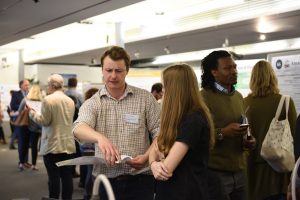As our 100 postgraduate researchers involved in this year’s Research without Borders festival prepare their exhibitions, discussions and presentations, we took a trip down memory lane to last year’s showcase and talked to the winner of the prize for Interactive Display, Henry Webber, an Archaeology and Anthropology PhD candidate.
Last year I applied to display my research at the Research Without Borders festival. I wanted to use the process as an exercise for thinking about my ideas, and how to present and communicate these ideas to a mixture of people from colleagues to academics, to the general public and other industries.
My research involves connecting archaeology with agriculture. It is about learning what impacts humans have had on the landscape, the material remains left in the soil, and how these may be impacting state of the art farming techniques and agricultural knowledge in the 21st century.
Some of the main aspects that I wanted to convey were the material aspects of my research, the focus on soils and how they are central to both archaeology (for the study of the human past) and agriculture (for the future of society). In addition, I wanted to showcase how agricultural techniques are changing with the evolution of remote sensing data, and software and hardware development. With an increased focus on high resolution data and precise methodologies, such as GPS steering of tractors and variable rate fertiliser application, requiring ever more detailed knowledge of soil variation, the impacts that humans have had on soils are becoming increasingly more important.
To try to engage people in my display and demonstrate these ideas, I brought in real soil and turf blocks to replicate a field with a crop. I then stripped off the topsoil and recreated a miniature archaeological site with darker colours of soil representing high organic matter and nutrient levels such as phosphorus, which is often found in conjunction with archaeological sites. I used toy tractors from my childhood to demonstrate the actions and spatial connection that farmers have with archaeology and to explain some of the contentions that currently exist between farmers and archaeologists. Next to this I had printed images of my case study datasets and a projector with several videos showing high-tech precision spraying, laser weeding and autonomous vehicles. I also brought some actual geophysical equipment (Ground Penetrating Radar) for people to use. With Ground Penetrating Radar, it is possible to see objects below the surface, and in the display hall we could tell where pipes, electric cables, and solid floor supports were from the way they reflect radar energy. This sort of technique is also however, commonly used to discover buried archaeology.
After I found out that I had won the prize for best interactive display, I was delighted! I had certainly got a lot out of the event already from just the networking and discussions with people, but the prize was an additional bonus. The prize consisted of money to put towards training of my choice, which I decided to use to improve and continue my professional development in being qualified in agronomic advice.
I had already completed a course in fertiliser and agronomy advice as part of the PhD, but this extra funding helped me to continue to be professionally accredited and knowledgeable about current agronomic

advice, issues, and legislation. This has great benefit for my research as, when talking to farmers, I can contextualise my research in ‘real life’ farming practices in the UK today. It has also helped me to engage with farmers and develop positive relationships around which my research can become much more reflexive. Finally, this training provides me with a qualification that will be useful in any future career path relating to food and farming and allow me to have a broader perspective.
The Research without Borders festival was certainly a great event and I am glad to see it continuing this year. It was worthwhile from many perspectives for me and I would encourage you to get involved to meet new people, try out new ideas and explore displaying your own research!
The showcase exhibition returns to Colston Hall frmo 2 to 5pm on 12 May in this year’s Research without Borders festival. Sign up for tickets via Eventbrite.

